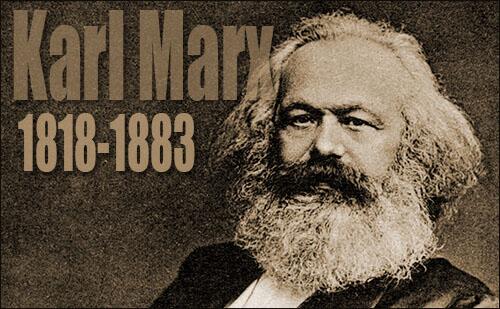A response to the Marxist poison in our media.
Editor’s note: The following essay is an excerpt from of David Horowitz’s “The Black Book of the American Left, Vol. V: Culture Wars” and is intended as an answer to the April 30, 2018, publication of the article “Happy Birthday, Karl Marx. You Were Right!” in The New York Times.
With its ninth and final volume now complete, “The Black Book of the American Left,” a collection of Horowitz’s conservative writings, stands as the most ambitious effort ever undertaken to define the Left and its agenda. (Order HERE.) We encourage our readers to visit BlackBookOfTheAmericanLeft.com – which features Horowitz’s introductions to volumes 1-9 of this series, along with their tables of contents, reviews and interviews with the author.
*
Karl Marx and the Los Angeles Times.
“The opening statement of Marx’s famous Manifesto, that the history of mankind is the history of class struggle, is really the essence and sum of its message. This message is above all a call to arms. According to Marx, democratic societies are not really different in kind from the aristocratic and slave societies that preceded them. Like their predecessors, liberal societies are divided into classes that are oppressed and those that oppress them. The solution to social problems lies in a civil war that will tear society asunder and create a new revolutionary world from its ruins. This idea of Marx has proven to be as wrong as any idea ever conceived, more destructive in its consequences then any intellectual fallacy in history. Since the Manifesto was written 150 years ago, more than a hundred million people have been killed in its name. Between ten and twenty times that number have been condemned to lives of unnecessary misery and human squalor, deprived of the life-chances afforded the most humble citizens of the industrial democracies that Marxists set out to destroy. Marx was a brilliant mind and a seductive stylist, and many of his insights look reasonable enough on paper. But the evil they have wrought, on those who fell under their practical sway, far outweighs any possible intellectual gain. It would be a healthy development for everyone, rich and poor alike, if future generations put Karl Marx’s manifesto on the same sinister shelf as Mein Kampf and other destructive products of the human soul.”
The above paragraph was written for the 150th anniversary of the publication of The Communist Manifesto in response to a request by Steve Wasserman, the editor of the Los Angeles Times Book Review. Wasserman was an old radical friend from Berkeley who had been a political protégé of Tom Hayden and Robert Scheer, two comrades who at the time were quoting Mao and Kim Il Sung, and attempting to organize guerrilla fronts in American cities, with which they hoped to launch a “war of liberation” in America. Inspired by texts like the Manifesto, Hayden’s troops practiced with weapons at local firing ranges and planned for the day when they would seize power, abolish private property and take over the means of production. It was therefore of some interest to me how Wasserman would treat the Manifesto now that he was an editor of one of the largest metropolitan newspapers in America. After the failure of the revolutionary hopes the 60s had encouraged, Wasserman had entered the literary world to become the editor of Times Books, and then of the L.A. Times Book Review. I kept in touch with him from a distance over the years, and knew him to be of the same mind as many other radicals, chastened by the failures of that revolutionary and destructive left but not willing to give up the intellectual traditions and political ambitions that had given it birth. So I was both curious and ready to respond when he called me to this task.
Wasserman requested a piece assessing the Manifesto and its impact in 250 words. “Yours will be one of six such statements,” he explained. “Well that’s a challenge, Steve,” I said to him halfjokingly. The article I actually wrote and submitted was 255 words, just five over his specification. But in the meantime Was ser man had changed his mind and cut the first 126 words of the piece, so that that the finished copy available to one million Times readers began with the sentence in the middle paragraph that reads, “Since the Manifesto was written 150 years ago, a hundred million people have been killed in its name.” The first part of the paragraph, which described the sinister message of the Manifesto as a call to war, and therefore why so many people had been killed, did not appear.
When the actual newspaper copy appeared, however, I saw the extent of Wasserman’s betrayal of our friendship, such as it was, and also of his readers. The “symposium” of the six mini-pieces, of which mine was one, was actually appended to a two-page spread with a picture of Marx, a poem by the German Communist Bertolt Brecht, and a fatuous 3,000-word lead essay by the unreconstructed Marxist Eric Hobsbawm, a man who had joined the British Communist Party in the 1920s and remained a member through the 1960s and all the slaughter of innocents along the way. This was the impression of the Marx’s Manifesto the Times editor really wanted to make on his readers.
For leftists like Hobsbawm, my comments about the hundred million people the Communists killed were beside the point, even though Marxists like Hobsbawm did the killing or justified it to fellow travelers and credulous audiences in the West. For Hobsbawm, the Manifesto was not a historical document nor a wrongheaded and destructive one. It was a living prophecy. According to him, it correctly analyzed the dynamics of industrial capitalist societies and provided a vision of the social future. The one concession he was willing to make to what actually had transpired in the last 150years was that it did not correctly predict that the proletariat would be the carrier of its revolutionary truth: “However, if at the end of the millennium we must be struck by the acuteness of the Manifesto’s vision of the then remote future of a massively globalized capitalism … it is now evident that the bourgeoisie has not produced ‘above all, its own gravediggers’ in the proletariat.”
But for Hobsbawm this error was of no consequence since the Manifesto’s central theme is correct: democratic capitalism must be destroyed or it will destroy us. According to Hobsbawm, even Communism’s failure only strengthens this Marxist idea: “The manifesto, it is not the least of its remarkable qualities, is a document that envisaged failure. It hoped that the outcome of capitalist development would be ‘a revolutionary reconstitution of society at large,’ but, as we have already seen, it did not exclude the alternative ‘common ruin.’ Many years later another Marxian rephrased this as the choice between socialism and barbarity. Which of these will prevail is a question which the 21st century must be left to answer.” In this Marxian fantasy the democratic postindustrial society we inhabit, with living standards higher and living conditions better for the mass of its citizens than available to any other people since the beginning of time, is no more than “barbarity,” a “common ruin.” And the only alternative is the socialism that Marx envisioned.
This, in 1998, is what for the Timeseditor—and in fact the academic establishment that has showered Hobsbawm with its highest honors—is the epitome of progressive thought. Of course the slogan “socialism or barbarism” was coined by Rosa Luxemburg at the end of the First World War, when Communists like Hobsbawm set out to destroy the liberal societies of the West and to create a Marxist utopia in the ruins of the Russian empire. Seventy years and 100 million deaths later, Eric Hobsbawm and Steve Wasserman have learned little from the experience. Steve Wasserman may not be ready to mount the barricades tomorrow and attempt to implement the vision laid out in this intellectual trash. But many, younger than he, will.
I did not call Wasserman when the Times symposium appeared; I wrote him a note instead.
February 16, 1998
Dear Steve,
The 75th anniversary of Mein Kampf is coming up. It’s too bad that Heidegger and Paul de Man are dead, but I’m sure you could get David Irving or David Duke to come up with a 3,000-word spread telling us why, even though it was written so long ago and has resulted in nothing but human misery ever since, it is still one of the most prescient and indispensable works for understanding western civilization and the Jews. You might also try that French Holocaust denier whom Chomsky likes so much. For my part, I’ll be glad to provide you with 250 words of balance again. Of course, if you should need more room for the fascists, feel free to cut whatever I send you in half.
How embarrassing, my friend.
Letters to the Publisher of the Los Angeles Times
[The letter that follows wasn’t merely revenge for the treatment my review of Marx’s Manifesto received. When Wasserman was first hired to edit the Book Review,he had asked me to write a letter defending his appointment, since an interview I had given which mentioned his youthful radicalism caused him some trouble. I did so and we then had a lunch at which I expressed my concerns about the virtual exclusion of conservative viewpoints from the Times. I hoped I had persuaded him of the merits of a pluralism of views, particularly in an institution like the Book Review. I was sorely disappointed in these hopes, and was not really prepared for the degree to which Wasserman actually turned the Review into an ideological journal of the left. The Manifesto episode was the final straw, prompting me to take my concerns to the Times’new publisher, Mark Willes, a former CEO of the Kellogg Corporation. As a very infrequent Timesop-ed page contributor, I had been invited to a Christmas Party at the op-ed editor’s house where I was one of only two conservatives present. I cornered Willes and told him my concerns and said that I would write to him. The futility of this exercise became evident when Willes turned my letter over to Wasserman for a reply]
Dear Mark Willes,
I would like to share with you my recent experience with the Sunday Book Review section of your paper. I am writing this in the spirit of our earlier conversation, and my understanding that the Times aspires to be the voice of the entire Los Angeles community, including those of us who are politically conservative. I am taking the liberty of copying this letter to Michael Parks and Leo Wolinsky, with whom I have shared my concerns on this or parallel matters.
On this particular Sunday, I open my Book Review and typically find four of the six major reviews identified on its cover to be written by leftists: Scheer, Davidson, Breines and Langer. For the purposes of this discussion, I will define “leftist” as someone who either writes regularly, or could write comfortably, for The Nation, the Village Voice or the LA Weekly. The same person probably is suspicious of the economic market and believes that real socialism hasn’t yet been tried, and that, while Bill Clinton should be defended against Republicans, he generally has “sold out” to the “corporate ruling class.” Thus, in this Sunday’s Book Review, Bob Scheer claims that the professional journalists of the Times itself have “career needs and class ambitions” that “coincide with the moneyed interests of the conglomerates and privileged families who pay their salaries.” I’m sure this will come as news to you (and to Michael and Leo). And I wonder how the Times can have such confidence in an insider [Scheer was a national correspondent for the Times] who should know better, yet who can write such stuff with a straight face. A conservative writer, by contrast, would be someone who writes regularly (or comfortably) for National Review, The American Spectator or The Weekly Standard.
The first thing I note is that there are no reviews by conservatives in today’s issue of the Los Angeles Times Book Review. Nor are there likely to be any such reviews on any given Sunday. Last December, the Review ran a feature on the 100 best books of the Times for the year. It was a selection from actual reviews that had appeared in the Times during 1997. There were 87 Times reviewers represented in the feature, some having reviewed more than one book on the list. There were many, many left-wing reviewers represented, including far-left propagandists like Saul Landau, a lifetime flack for Fidel Castro. On the same list, however, I was only able to locate one reviewer, Walter Laqueur, who could reasonably be defined as conservative, although he is an academic writer rather than a political author in the sense I defined above. Laqueur writes for The New Republic and The New York Review of Books, rather than the three conservative publications, but also, if I’m not mistaken, has written on occasion for Commentary. Though I should probably know better, I find this virtual exclusion of political conservatives shocking and, if not calculated, inexplicable. At the same time, this exclusion is very much the policy, conscious or otherwise, of the Times Book Review, which is currently being edited as though it were The Nation, rather than one of America’s most important journalistic institutions.
I had my own unhappy experience with the Book Review in February, when its editor Steve Wasserman asked me to write 250 words as part of a seven-article symposium on the 150th anniversary of The Communist Manifesto. As edited by Wasserman, my piece and two others that were harshly critical of the Manifesto became mini-appendages to the 3,000-word feature by Eric Hobsbawm, a lifelong Communist and unreconstructed Marxist. Hobsbawm, who joined the Communist Party in the 1920s and stayed for nearly half a century, celebrated Marx’s text as a brilliant and prescient analysis not only of 19th-century capitalism (which would have been bad enough) but of contemporary society as well. His preposterous thesis was supported by another 500-word contribution Wasserman solicited from an East German Marxist, who made similar claims. In his feature essay, Hobsbawm exempted Marx from responsibility for the epic crimes that Marxists had committed, and that he had dedicated his own intellectual life to defending. Hobsbawm concluded his article by proposing that the choice facing Americans now—a choice, in his view, foreseen by Marx—was ‘barbarism or socialism.’ This is exactly how Lenin sold Bolshevism in 1917. How embarrassing for the Times to have featured such a claim. How odd that the Times, a product of American capitalism and its First Amendment freedoms, should construct a symposium not just to include this point of view but to promote it.
I am enclosing a correspondence between Wasserman and myself about this symposium. I think it is clear from this exchange that Wasserman has an agenda in defending Marx, and does not have much respect for a perspective that regards these views as bankrupt, and that is pretty much accepted not only among conservatives but across the spectrum outside the left. I have known Steve for thirty years and our relationship has been perfectly cordial. But my experience with the symposium and our letter-exchange leaves me with the strong feeling that people with views like mine are not really part of the Times’ community—certainly not in the sense that the school of neo-Marxists like Hobsbawm, Scheer, Landau, Davidson, Breines, Langer, Christopher Hitchens, and a host of others who appear regularly in its book pages, are. Nor would it be reasonable for conservatives like me to expect that except on rare and idiosyncratic occasions the Book Review would either include our views in its ongoing dialogue or treat them with the regard they deserve. This is regrettable and hardly in keeping with what ought to be the standards of a great metropolitan paper.
Sincerely, David Horowitz
[Instead of answering my first letter, Mark Willes washed his hands of the problem and turned the letter over to Wasserman about whose editorial policies I was complaining. I should have washed my hands of the matter, too, but instead made another futile stab at opening a discussion.]
[Second Letter]
Dear Mark Willes,
I have received a response from Steve Wasserman to my letter, which he wrote at your request. I have already had a correspondence with Steve that makes clear his unwillingness to acknowledge the problem. It is hardly surprising then that his response is not really a reply to the issue I raised. Moreover, its central argument is incomprehensible.
What can it mean to say, as he does, that the “categories of Left and Right have been rendered hollow and meaningless by the human experience of the recent past?” If that is so, why does the Times print a “Column Left” and a “Column Right” on its op-ed page? Does he really think that the views expressed in The Nation and National Review—my specific points of reference for the terms “left” and “right”—are wildly unpredictable, or indistinguishable from one another? Are there not generally recognizable “left” and “right” views of the role of government in the economy, of affirmative action, of school choice, in fact of virtually every issue the Times treats daily? Of course there are, and the Times editors not only know it but report it that way. Why does the Times print polls categorizing respondents as “liberal” and “conservative” if these categories are meaningless? Why, then, is it so difficult to recognize these divisions in the editing of the Times Book Review?
My issue, of course, was not “to weigh up the anti-Communist credentials of our occasional contributors as the chief criterion of their right to be published,” as Wasserman disingenuously suggests. Such a position would indeed be “vile and shameful,” but it has nothing to do with anything I wrote to you, to Wasserman, or at any time in my long public career. In fact, I raised no objection to any particular author being published, not even Eric Hobsbawm. I have not proposed any political litmus to be applied to contributors to the Review, as Wasserman implies. On the contrary. I am objecting to the political litmus that is presently being applied by Wasserman himself.
Nor is it “bean counting” or asking for “quotas,” as Wasserman suggests, to point out that only one writer for the Review out of eighty-seven represented in the year-end issue can reasonably be called conservative. I have not asked for absolute balance or strict equality of representation, or anything remotely resembling that. The issue I have raised is the overwhelming weight given to one side of the political argument in the selection of contributors and the presentation of points of view. I am concerned about the systematic bias in the editing of the Book Review, which minimizes one side of the national debate, and makes the Review a merely partisan publication—uninteresting to those outside the choir, and unworthy of the Times and its ambition to serve the entire community. In his letter, Wasserman does not respond to the issue I raised, nor does he explain the policy of the Book Review that would lead to the kind of imbalance I pointed out (or the Review’s embarrassing celebration of Marxism in the year 1998). Nor does he provide an intelligible explanation for ignoring this problem. I hope, therefore, that this is not the end of the dialogue. I would be happy to discuss this further with you or with your editors at your convenience.
Sincerely, David Horowitz
Want more BFT? Leave us a voicemail on our page or follow us on Twitter @BFT_Podcast and Facebook @BluntForceTruthPodcast. We want to hear from you! There’s no better place to get the #BluntForceTruth.







